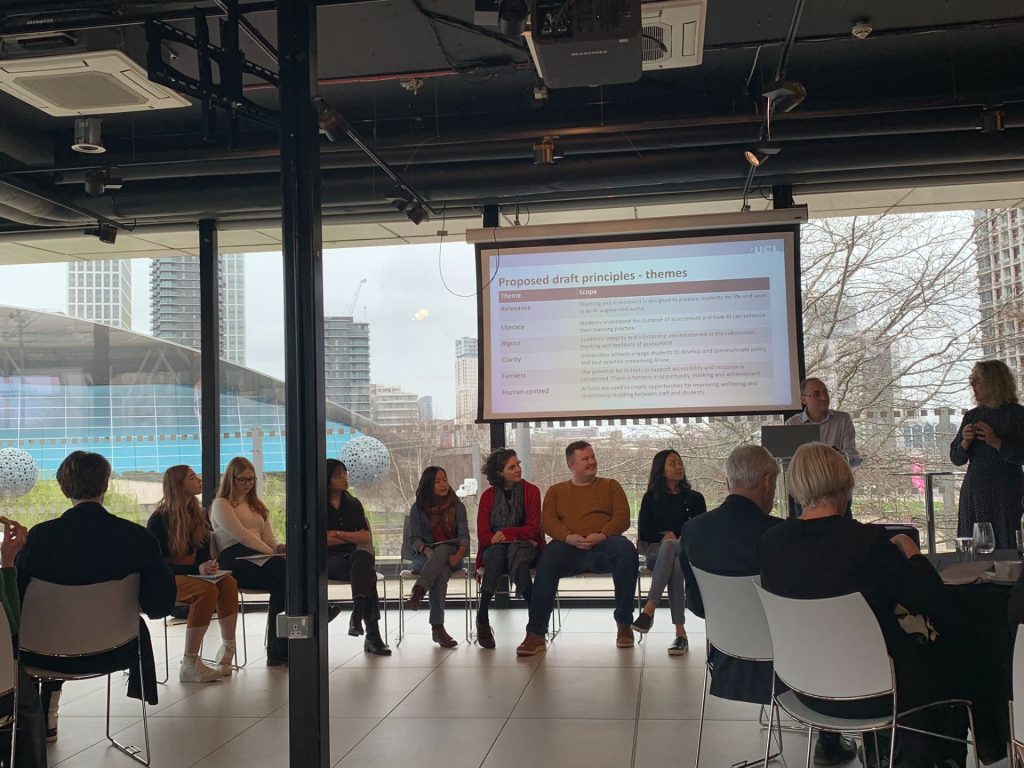Generative AI: Lifeline for students or threat to traditional assessment?
By Marieke Guy, on 21 April 2023
Our increasingly complex world has made the potential impact of artificial intelligence on education more relevant than ever. Gone are the days when AI’s role in academic assessment required extensive explanation; it has become embedded in our daily lives. This shift has caused a wave of concern in Higher Education as traditional assessment practices risk becoming obsolete.
This post is a version of a one that appears on the National Centre for AI blog. It was reframed using Chat-GPT4.
In March, Russell Group university leaders convened to discuss the impact of AI on education and the implications for the sector. The event, chaired by Kathy Armour, Vice-Provost (Education & Student Experience) at UCL, featured a panel of students from various disciplines, sharing their experiences and insights on how AI tools, such as ChatGPT, have transformed their approach to learning.

Student panel on AI and assessment facilitated by Chris Thomson, Jisc. The panel summary was provided by Kathy Armour, Vice-Provost (Education & Student Experience) at UCL
The students’ accounts made it clear that the genie is out of the bottle; AI is now so deeply integrated into their learning experience that it would be futile and dangerous to resist the change. For many, AI has become a “lifechanging” educational companion, offering a level of support that is impossible to ignore. As such, the students argued, returning to traditional exam halls or engaging in an AI detection arms race would be detrimental to their future employability and wellbeing.
It is evident that a collaborative approach between students and educational leaders is necessary to navigate this brave new world.
Prior to the event the students contributed to the drafting of a set of future-proof principles related to AI and assessment, addressing concerns such as relevance, literacy, rigour, transparency, fairness, and human-centred education.
The students expressed a desire for their education to prepare them for the wider world and the future workplace, necessitating the adoption of AI in learning, teaching, and assessment. Additionally, students and staff must be supported in developing academic skills in relation to AI, ensuring that learning and development opportunities are not missed. The students pointed to friends who were already creating AI-based start-ups.
Transparency and fairness are crucial when AI tools are used in assessment and marking. Students are particularly concerned about the potential for a widening gap between those who can afford AI tools and those who cannot. This raises the question of whether universities should provide paid-for versions of AI tools as part of their standard IT provision.
Moreover, learning, teaching, and assessment must remain human-centred. AI should enhance, not replace, relationships between students and educators, and AI interactions should promote a pedagogy of care. If students rely on AI to bypass required academic work, it is essential to ask why and provide additional support as needed.
This thought-provoking event demonstrated the importance of engaging in open dialogue with students about the role of AI in education and assessment. As Kathy Armour noted, the challenges posed by AI and assessment are not new; they are rooted in longstanding issues of assessment and curriculum design that continue to challenge the sector. Embracing the potential of AI in education can offer a lifeline to students, but it requires a delicate balance between technological innovation and maintaining the integrity of traditional learning experiences. By working together, students and educators can create a path forward that incorporates AI in a way that benefits all.
The event also featured visionary case-studies from sector-experts on AI: Sue Attewell, Head of edtech and lead at Jisc’s national Centre for AI in tertiary education, Professor Mike Sharples from the Institute of Educational Technology at the Open University and Michael Veale, Associate Professor and Deputy Vice Dean (Education) in the Faculty of Laws at UCL.
Thanks go to those involved in this work:
Students:
- Matthew Banner – Postgraduate in the third year of a PhD in Biochemical Engineering, leading on a student-led partnership project considering assessment design and AI.
- Sophie Bush – Undergraduate student on History and the Philosophy of Science BSc and lead course rep for Science and Technology studies.
- Megan Fisher – Second-year undergraduate student studying Economics, with chosen modules in Environmental Economics and Algebra.
- Rachel Lam – First-year undergraduate law student, serves as a student partner on the assessment design and quality review team.
- Jennifer Seon – In last year of my part-time master’s programme studying Education and Technology, dissertation will focus on collaborative problem-solving in assessment. Recently interviewed AI expert Wayne Holmes for a podcast with the UCL AI Society.
- Bernice Yeo – Postgraduate student taking the MA in Education and Technology. Works as an examiner for the International Baccalaureate.
- Sopio Zhgenti – Postgraduate student studying Education and Technology at the Institute of Education with special interest in Artificial Intelligence.
Staff:
- Marieke Guy (Head of Digital Assessment), UCL
- Zak Liddell (Director of Education & Student Experience, MAPS), UCL
- Joanne Moles (Head of Assessment Delivery and Platforms), UCL
- Jennifer Griffiths (Associate Director in the UCL Arena Centre for Research-based Education), UCL
- Lizzie Vinton (Assessment Regulations and Governance Manager, Academic Services) , UCL
- Chris Thomson (Programme lead for teaching, learning and assessment), Jisc
 Close
Close



